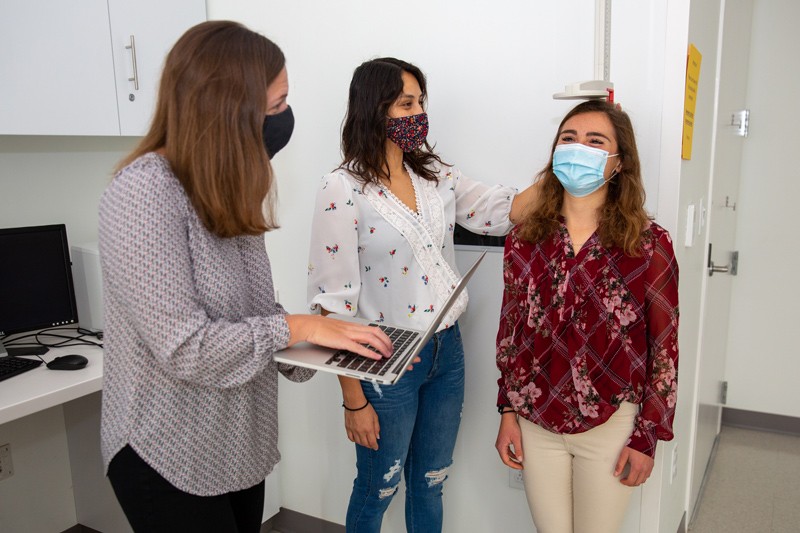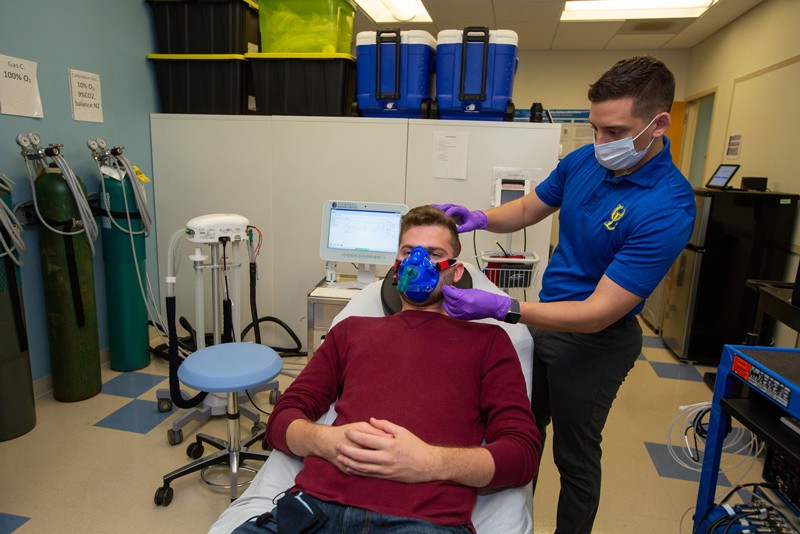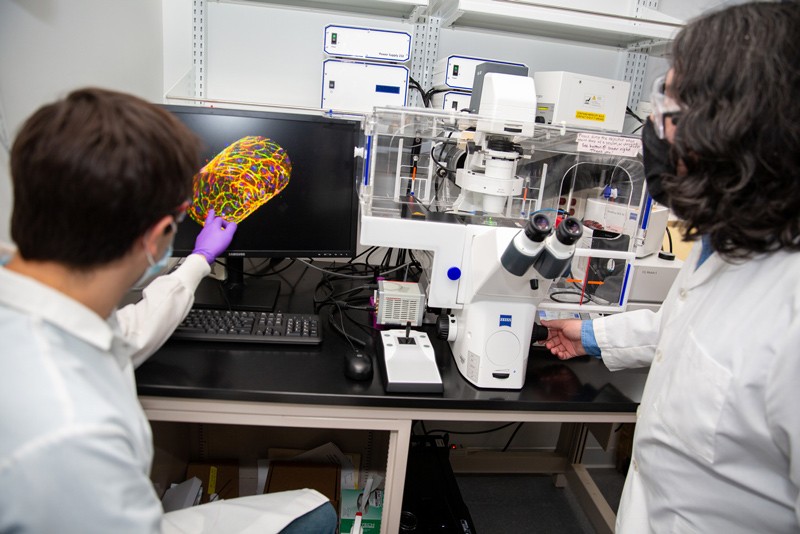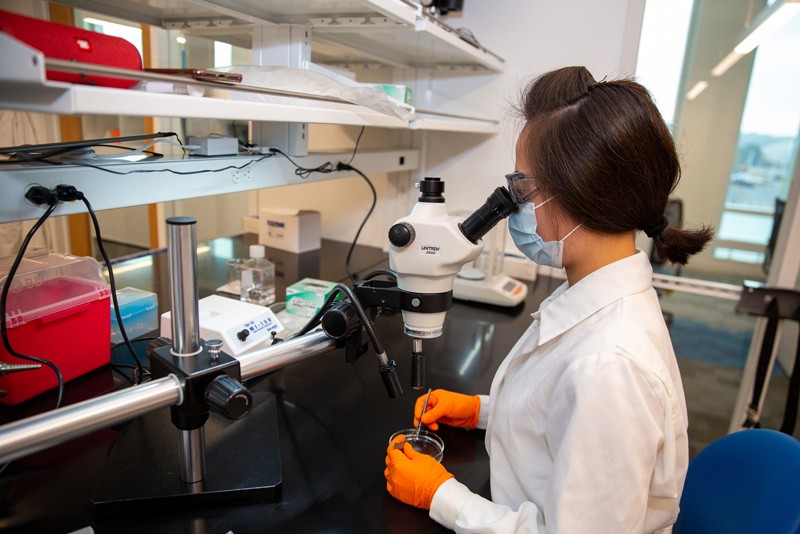Federal funding provides opportunity for new investigators to succeed
The renewal of a federal grant to the University of Delaware’s Center of Biomedical Research Excellence (COBRE) is enabling the center to expand its research into new aspects of cardiovascular disease while also providing the opportunity for additional graduate students to gain valuable research experience.
The Phase II renewal is for a grant from the National Institute of General Medical Sciences (NIGMS), which is part of the National Institutes of Health (NIH). The COBRE in Cardiovascular Health is led by Dave Edwards, professor from the Department of Kinesiology and Applied Physiology who serves as principal investigator, overseeing implementation and growth of the center.
Cardiovascular diseases are the largest contributor to death in the U.S. for both men and women. The overall goal of this COBRE is to support multidisciplinary research focused on understanding the mechanisms that contribute to causes and consequences of poor cardiovascular health, and to ultimately develop effective interventions for these conditions.
There are three phases involved in the growth of the COBRE. Phase I offered an opportunity to graduate the first group of new investigators to financial independence as well as providing resources for the expansion of cardiovascular related research. Phase II has led to supporting the research of four additional investigators.
“We provide comprehensive mentoring and career development to support our new investigators,” Edwards said. “Additionally, we have regular meetings with an external advisory committee and other investigators to share research progress and provide feedback to help advance their careers. Combined with infrastructure of the Research Core and pilot program, the center is positioned for long-term stability.”

Shannon Robson (left), an associate professor, practices interventions with research assistants Adriana Verdezoto Alvarado (center) and Bailey Davin in the Energy Balance and Nutrition Lab.
Shannon Robson, associate professor in the Department of Behavioral Health and Nutrition, oversees a project focused on increasing family meal frequency as a strategy for prevention of cardiovascular disease in children. Robson’s team will test if increasing family meal frequency will improve diet quality, a cardiovascular disease risk factor, over traditional methods of increasing individual-level fruit and vegetable intake using a parent-delivered behavioral-based intervention.
Robson said the new funding will have an “incredible impact” on new investigators.
“This COBRE mechanism supports many facets of moving forward science and research,” Robson said. “There is a focus on obesity throughout the center that encourages collaboration across disciplines in the interest of improving cardiovascular health.”
Ibra Fancher, assistant professor in the Department of Kinesiology and Applied Physiology, is a project investigator hired in Phase I and will explore endothelial dysfunction in arteries resulting from obesity in Phase II. Fancher said that Phase I of the COBRE funding created an “opportunity to get hired” and pursue his research.
“The major focus of my research is obesity and dysfunction in the circulatory system,” Fancher said. “This dysfunction is unusual because obesity impairs certain vascular beds but not others. I am researching ion channels in endothelial cells that line the arteries, which operate as regulators for mechanical stress and signaling. Higher stress leads to increased damage.
“Through the COBRE funding, we are able to use both animal models and human studies to complete our research. Recruiting these participants has been critical to our progress, providing biopsies and tests to analyze the functionality of their arteries.”

Doctoral student Ted DeConne (right) utilizes blood testing on Houston Ward to analyze the effects of added sugar intake on brain blood flow and hippocampal function.
Chris Martens, assistant professor from the Department of Kinesiology and Applied Physiology, is a project investigator exploring the effects of added sugar intake on brain blood flow and hippocampal function in midlife adults.
“Factors that contribute to an increased risk in cardiovascular disease also create an increased risk for brain disease,” Martens said. “My team is exploring how components of a Western Diet, such as a high amount of added sugars, impact the brain and risks for cardiovascular disease. The equipment and personnel provided by COBRE allows us to analyze images of blood vessels in the brain to determine their capabilities for effective protection from these factors.”
John Slater, associate professor in the Department of Biomedical Engineering, will be determining the influence that blood flow dynamics have on injury to neurons and brain-based microvascular dysfunction. He is testing a hypothesis for cellular damage resulting from pulsating flow using a novel engineered micro vessel system.

John Sperduto (left) and Ryan Taitano in the biomedical engineering lab inspect a complete vessel-on-a-chip device by imaging the cell nuclei (blue), actin (red), and cell-to-cell junction (green).
Through continued COBRE funding and successful transition of new investigators to independence, the center will expand its impact for cardiovascular research and continue to prepare replacement project leaders over the five years of its funding.
“Our long-term goal is to build infrastructure,” Edwards said. “We aim to continue supporting new investigators as well as purchasing new equipment and providing core resources for cardiovascular research. Ultimately, we plan to reach Phase III and become a self-sustaining center. We have a strong foundation in cardiovascular research and will continue to thrive with this new group of investigators.”

